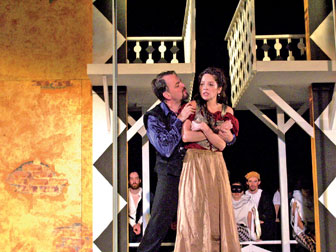Re-smelling Romeo's rose
By Dilshan BOANGE
The works of William Shakespeare are foundational to the discourse(s)
of English literature. The works of the 'bard of Avon' have stood the
test of time to be treasured as carrying 'eternal truths' that explore
human nature and the ways of the world, and thereby deliver sagely
teachings couched in the beauty of poetic language. Many are the lines
from his plays that are still quoted in an everyday situation in the
manner of an aphorism; and it is one such Shakespearean line that I wish
to make the focus of this article.
 |
|
Milan Kundera |
In Romeo and Juliet we find one of the most well known stories of
tragic young lovers. This play also contains one of the most quoted
lines by the Bard -"What's in a name, that which we call a rose by any
other name would smell as sweet?" In discussing the relevance of this
particular line as an aphorism to apply in situations in life it would
be important to consider how it seems to negate the function of a name.
Certainly the sentiment expressed by the lovelorn teenage Romeo in afore
quote would not be applauded by modern day marketers who thrive on
'brand' value. And a name is very much the basis for branding, in that
sense.
The discussion I would like to build on is how the line written by
Shakespeare intended to portray the mindset of the young and naïve Romeo
is generally attributed to be an advocacy of the Bard himself in layman
interpretations. Yes, Shakespeare wrote the line, but does that suggest
it is his own belief and applies as absolutism? It is in exploring the
relevance of such a line as this that one can look at certain
postmodernist literary criticism, such as the French theorist Roland
Barthes's concept of 'The Death of the Author', which can be applied to
unravel greater interpretive scope of a text. Barthes propounded in his
essay "The Death of the Author" that a text can be divorced of its
author and allow the reader a greater autonomy to interpret what the
text may mean to him. This means to say that as a 'reader' one can and
should feel free to allow the meanings of the text to take shape in the
course of reading, rather than feeling it is only the creator of the
text (the author) who has the right to interpret it and that the
reader's role is to unravel the meanings, intentions and 'message(s)' of
the author embedded in the text and its narrative. Thereby in classical
criticism if an interpretation of a text by a reader may not seem to be
the very intention that the author intended to convey then such
interpretations would be declared as 'invalid'. In contrast postmodern
textual analysis/criticism offers much greater space for the reader to
explore possible 'meanings' of a text, regardless of whether or not they
were intended by the 'author'.
Often when one quotes Shakespeare (or any other writer or speaker for
that matter) it is done with reference to the source. The name (and
possibly even the work) is mentioned. This is of course ethically
required by norms in order to avoid being seen like a fraud who claimed
credit for another's creation. But on another level the mentioning of
the source and especially if it is a name held in great esteem in
society the name acts as a certificate to authoritatively assert the
validity of applying the quoted line to explain an idea or argument. It
is after all 'the words of Shakespeare' one could say and build ground
to justify ones stance and find sufficient safety and shielding from
critical attacks. In the essay "What is an author" the French
intellectual Michele Foucault charts the origins of the role of the
author in European society and how the 'author' over time gained a
position of eminence in society and thereby becomes an 'authority'. The
name of the author, his presence, and the authority he wields over the
text he creates is called by Foucault as the 'author function'.
 |
|
A scene from Romeo and
Juliet |
 |
|
William Shakespeare |
When one quotes the line "What's in a name..." is it to assert one's
views with the backing of Shakespearean thought? To strengthen one's
position in an argument and make the other yield by impressing on him
that he is up against the words of Shakespeare? But in such an instance
does one question the relevance of such a notion? Is it universally
relevant and applicable? One of the aspects to focus on is that the
flower is an item of 'materiality' and its fragrance (and possibly the
attributes of its appearance and texture of petals) is what is most
valuable. And if one cares to give thought to the 'context' in which the
line is used in the play, the relevance and application of a line such
as "What's in a name..." could become more evident. The line was used by
Romeo, and is meant to demonstrate the nature of his psychology. Romeo
is after all a teenager who is tormented by the fact that his sweetheart
Juliet is of the house Capulet, the sworn enemies of his own family, the
house of Montague, and thus wishes the burden of the 'politics' that
comes with the 'name' be made to vanish. A character in a work of
literature needs to be given certain autonomy to unfold in the course of
the narrative and need not necessarily reflect views and beliefs of the
author himself. Therefore it is the beliefs and mindset of the love
stricken teenage Romeo that comes out through the line of "What's in a
name..." If one were to divorce the name 'Shakespeare' (and the
authority that comes with it) as the one who wrote it, and looked at the
text (the quote) for its possible 'truths' and what relevance it holds,
then maybe the absurdity of accrediting that line a ground of
absoluteness would be very apparent.
In connection with this line of discussion I feel it is very
significant to cite a perspective of the Czech born postmodernist writer
Milan Kundera who in his quasi-biographical novel "The Book of Laughter
and Forgetting" speaks of the importance of a 'naming' and also
'renaming' in a 'political landscape'. Kundera deals with the subject of
identity in a significant way in a number of his works and in "The Book
of Laughter and Forgetting" speaks of how a 'name' is very much
political and can by no means be negated as insignificant. Kundera
believes that a name presents continuity with the past, and therefore to
replace or supplant one name with another is a 'political' act.
In an age of innocence, storm tossed amidst emotions of unrelenting
love and unyielding social prejudices, the young Romeo certainly wanted
naught but the sweet scent of his flower, Juliet. And to him a name
would be as the same as another or even possibly equal to namelessness.
But beyond the world of flora and fauna in the world of power and
ideologies perhaps Romeo's 'truths' in the lines "What's in a name..."
may find stringent limitations.
|

